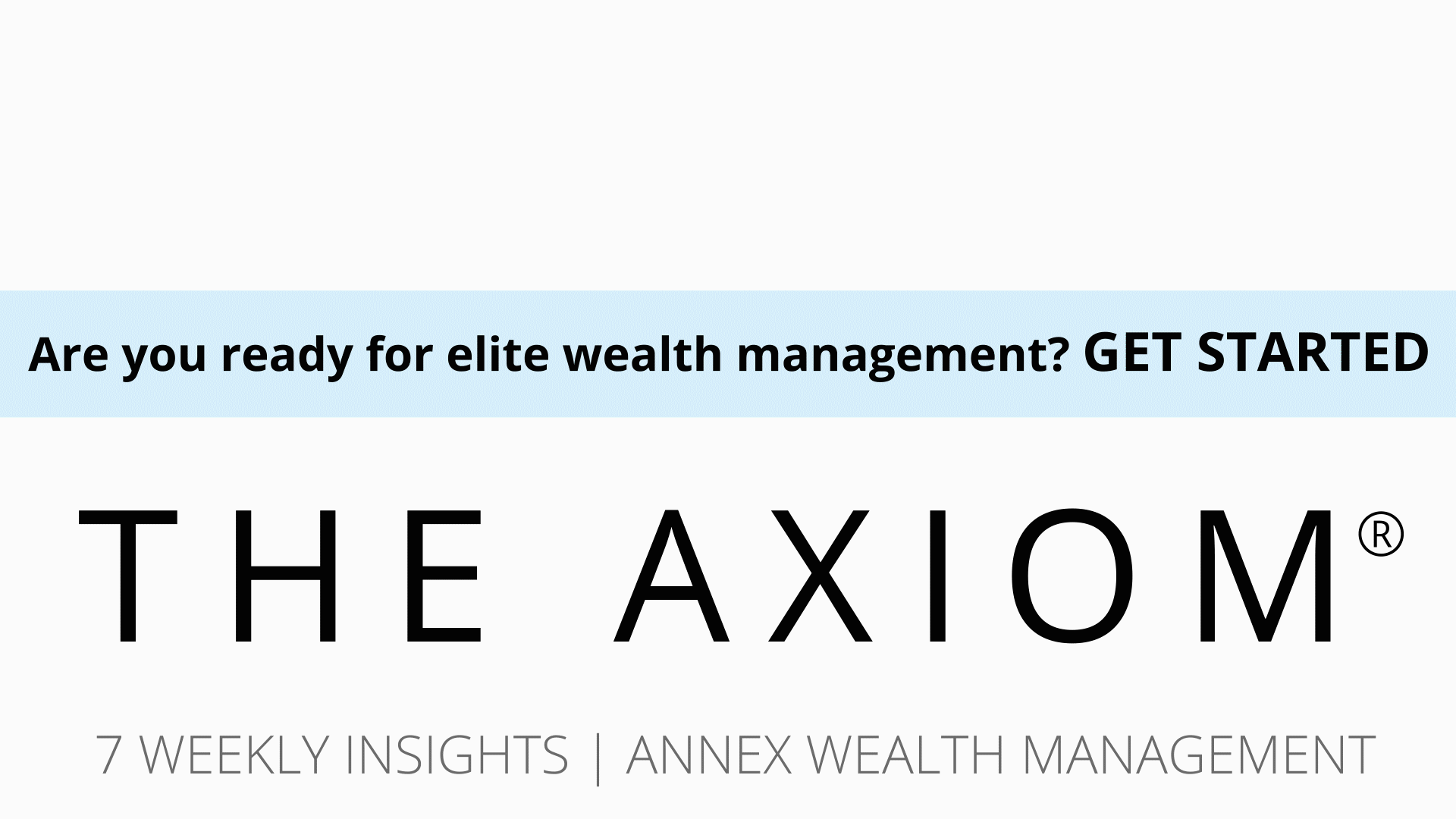
Axiom | Vol 247
Featured: Meet The Axiom’s Guest Editor: Eric Strom, CFP® | Inside: One Year Later, The Economy Is Rebounding – How Will It Navigate Crosscurrents? | Poll Recap: Did You Play More Golf Than Last Year? | MoneyDo: Consider If You Need Life Insurance. If So, How Much? | Ask Annex: Does My Wife Have To Pay Taxes On A Life Insurance Policy If She Cashes It Out? | DYADT: Does Your Advisor Help You Plan For Specific Needs Like Life Insurance? | First Full Month Of Ford Mustang Mach E Sales | This Small Business Pulse Survey | What’s A Bond?
Oops! We could not locate your form.

Meet The Axiom®’s Guest Editor: Eric Strom, CFP®
I’m Eric Strom, a Senior Financial Planner here at Annex Wealth Management.
My role at Annex, as a member of the Financial Planning Team, is to assist our wealth managers and Annex clients with certain subject matter areas where I have specific advanced knowledge, such as tax planning, social security, and more.
I live in Milwaukee with my wife and 5-year-old daughter. I enjoy running, hiking, taking my kiddo to the zoo, and obsessively following the latest news and images from the Perseverance rover on Mars. I’m a frequent presenter at many of Annex’s educational events and contributor to Annex’s radio programming. I also enjoy speaking to students on the topic of financial literacy and making positive financial choices starting out in life.
BACK TO TOP ↑

One Year Later, The Economy Is Rebounding – How Will It Navigate Crosscurrents?
One year after the markets plummeted, fueled by hard work, stimulus, and vaccines, the economy has evolved from a “K-shaped” recovery to a “V-shaped” one. What lies ahead for the markets, and how will the Fed react to rising prices? Annex Wealth Management’s Dave Spano and Derek Felske discuss.
BACK TO TOP ↑

Did You Play More Golf Than Last Year?
When states started reopening last summer, golf courses, golf equipment, and overall interest in the sport grew. Recent polls show a spike in playing golf during the pandemic, and there have been over 50 million incremental rounds of golf played since June 2020, according to the National Golf Foundation. Equipment sales are also the best in years, with a surge of sales happening throughout July and August of 2020.
According to our latest poll, we had a three-way tie with responses. 33% of respondents said that they have done more golfing this past year, with another 33% saying that they do not golf. The other 33% mentioned that they have not been enjoying golf over the past year despite recent studies suggest that there was a spike during the pandemic.
Preparations for another summer during the pandemic are underway with many golf courses, resorts, and country clubs gearing up for more visitors. Families and individuals have also shown more interest in golf lessons and camps that embrace the sport and encourage more outdoor activity.
BACK TO TOP ↑

Consider If You Need Life Insurance. If So, How Much?
Part of planning involves hard questions that often carry heavy emotional weight, like:
- What would happen to your family if you were to die suddenly?
- Are they dependent on your income from work?
- Will your family have enough for other expenses?
No one likes to consider severe personal tragedies, but answering tough questions honestly is the sort of thoughtful, deliberate planning that may give you and your family peace of mind.
The centerpiece of a financial plan is income from work. Your income funds financial goals such as saving for college, retirement, new automobiles, and family vacations. Work income often also funds expenses such as mortgage payments, groceries, braces, medical expenses, utility payments, loan payments and the list goes on and on and on…. In many cases, without your income, your family will likely face financial stress at some point in the future.
This week’s MoneyDo is “Consider If You Need Life Insurance.” Most financial plans assume you will continue to earn income from today until retirement. If you die, your income goes away therefore, it should be protected with a life insurance policy.
As an example, assume you’re 55, plan to retire at 65, and are married with 2 kids in college. In this scenario, currently, your income is sufficient to fund all your goals and monthly expenses. Your financial plan assumes at retirement you’ll be financially independent, and income will no longer be necessary. Therefore, if you were to die tomorrow, it’s your responsibility to replace your income for the next 10 years with life insurance.
So, the quick answer to the first part of this week’s MoneyDo is, in the scenario we’re considering, you do need Life Insurance. Now, it’s time to consider how much. The quick answer is 10 to 12 times your income will adequately protect those dependent on your income.
Of course, the closer you get to retirement, the less insurance you’ll likely need. For a more detailed estimate, consider talking to a financial planner who can give you a detailed estimate of your life insurance need.
That’s just one scenario – you’ll learn that there are other instances where life insurance is needed, as well. A couple of examples are:
- Business owners: If you were to die, is there an agreement, such as a buy/sell agreement, to help provide liquidity to your business partners and your estate? Life insurance can be used to help another party in the business purchase your interest from your estate, making the distribution of your business assets to your heirs easier.
- Large Estates: Some estate planning techniques can be implemented with life insurance to help manage the estate tax. If structured properly, life insurance can pass estate tax-free to your heirs, and can be used to pay final expenses.
There are many different types of life insurance, but the most common types of life insurance are term, whole, universal, or variable life insurance. A brief description of each:
- Term Life Insurance: The coverage will last for a given time-period, for instance 30 years. You pay annual premiums until the term ends then the policy terminates. There is no accumulated cash value (a savings component of a life insurance policy). Since there is a finite term and no additional savings, the premiums tend to be less expensive.
- Universal Life Insurance: Like term life insurance with several other additional features or options, including a cash value accumulation feature. Premiums can vary depending on the cash value amount.
- Whole Life Insurance: Provides guarantees from the insurer not found in term or universal life insurance. If the premiums are paid the policy will remain in force during the life of the insured regardless of cash value. Because of these guarantees, premiums tend to be more expensive.
- Variable Life Insurance: Much like a universal life insurance policy with one major exception-variable insurance policies permit the owner to direct the investment of the policy’s cash value. Therefore, these policies contain investment risk.
BACK TO TOP ↑

What I like about Axiom is that we here at Annex are actually creating our own content – what a concept! It is common for financial advisors to purchase generic content and “white label” it as their own. The Axiom reveals what we really think in an authentic way. With videos, radio shows, events, MoneyDo posts, and more – we are making it all ourselves. The Axiom is a way for you to both learn something about your money and get to know who we are.
– Guest Editor: Eric Strom, CFP® | Senior Financial Planner
__________________________
This week’s Ask Annex comes from Todd, who asks:
“Does my wife have to pay taxes on a life insurance policy if she cashes it out?”
___________________________
We asked Annex Wealth Management’s Eric Strom, CFP®:
The answer is, maybe. Generally speaking, with each premium payment your wife has made over the years to pay for that life insurance policy, she has been building up what is called cost basis. That is her money that she’s already paid taxes on that is “inside” the life insurance policy. If her life insurance policy is the type that builds up cash value, then she has the benefit of cashing in the policy whenever she chooses, though as a side note – she’ll want to consider if there are surrender charges or any other fees that may reduce her cash value upon surrendering.
If, at the time she cashes in the life insurance policy, the cost basis is higher than the cash value, she will typically owe no taxes at all. On the other hand, let’s say that it’s an older policy that’s been growing for a while, it could be that the reverse is true – the cash value is higher than the cost basis. In that case, typically all of that difference will become immediately taxable as ordinary income in the tax year the policy is surrendered. Ordinary income is the least favorable type of income on your tax return, so you’ll want to be extra careful here.
Other factors such as policy loans can affect the taxable gain as well. Please have the policy professionally reviewed to determine the tax consequence, and to discuss the pros and cons of cashing in the life insurance. We at Annex offer that service and would be happy to help you with exactly that, just reach out to us if you are interested. Our team reviews hundreds of life insurance policies every year, so we’re glad to help you too!
BACK TO TOP ↑

Does Your Advisor Help You Plan For Specific Needs Like Life Insurance?
As a fee-only fiduciary, Annex Wealth Management will never sell you a product. Which means, we don’t sell insurance. What we will do: help you identify when there is a true financial planning need for insurance and then connect you with an appropriate provider based on your specific needs.
BACK TO TOP ↑


KNOW THE DIFFERENCE MINUTE:
First Full Month Of Ford Mustang Mach E Sales
KNOW THE DIFFERENCE MINUTE:
The Small Business Pulse Survey
WHAT’S THAT?
What’s A Bond?
BACK TO TOP ↑

Maybe I’m biased, but here’s my favorite part of Axiom. One thing that makes us different from other firms is that while we offer events to attract new clients, that’s not our sole point of focus.
So, whether you’re a client, or not one yet, this events section usually has an upcoming event for you.
– Guest Editor: Eric Strom, CFP® | Senior Financial Planner
Annex Wealth Management provides free workshops, open to the public, on key wealth management topics.
Each week, we provide links to register for upcoming events.
BACK TO TOP ↑






